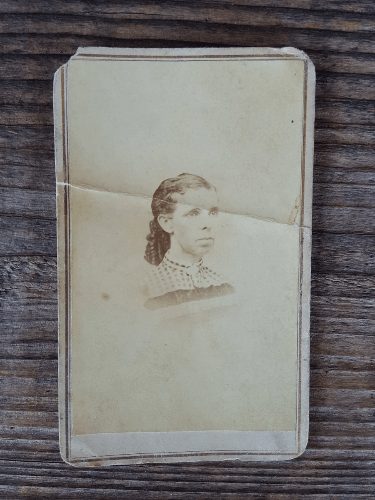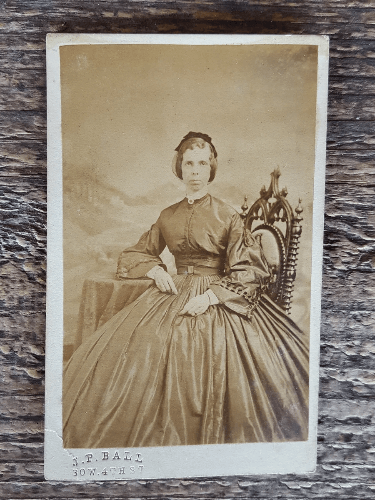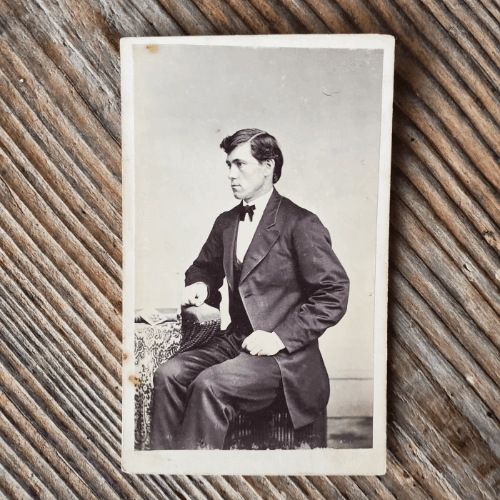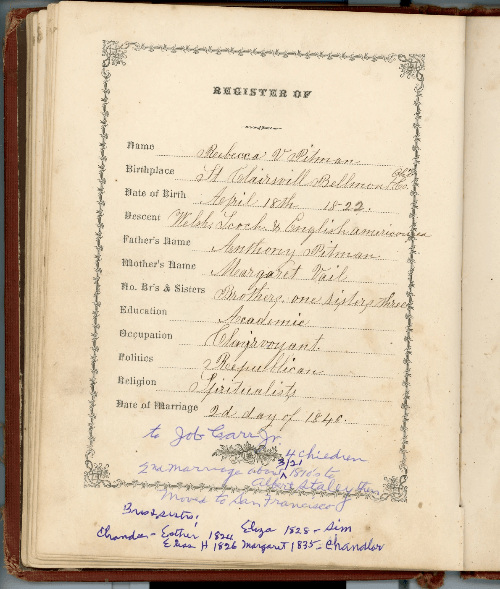This is the fourth in a multi-part series about the religious affiliations of the Carr family.
The first part about the family Quaker heritage is available at this link.
The second part about the family's Quaker affiliations in the 1800s is available at this link.
An article exploring the history of Spiritualism is available at this link.
An additional article about Job Carr's association with Spiritualism is available at this link.
Although Job and Rebecca Carr were raised in the Quaker faith, they were estranged from the official Quaker church by the 1850s. After this split with the formal church, they each gravitated toward the Spiritualism movement and its associated progressive social movements for racial and gender equality. This article explores Rebecca's association with Spiritualism.

Photograph of a young Rebecca Carr. From the Carr Family archives.
Rebecca Carr Finds Spiritualism
Rebecca found Spiritualism sometime after formally leaving the Quaker faith in 1847. One source claims that she became interested in the movement in the decade before the Civil War and persuaded Job to attend meetings. She may have been one of the many women attracted to Spiritualism by the independence it offered.
The Spiritualism movement grew rapidly during the American Civil War. With a death toll that reached nearly 700,000 people, families searched for a way to deal with their grief. Many soldiers died far from home, often unidentified, and their relatives longed for a way to reconnect with them. Spiritualism provided a means of comfort and closure as mediums offered ways to communicate with the dead.
Although the Carr family survived the Civil War, they experienced its trauma and destruction firsthand. Rebecca served as a nurse matron during the conflict, providing care to the wounded and dying. Her field hospital followed Job's unit, the 36th Indiana, to some of the bloodiest battlefields of the war, including Shiloh and Corinth. Spiritualism may have been one way she found to deal with the carnage of the war.
As noted in the previous blog post, the Spiritualism movement also offered women like Rebecca a path toward financial and social independence. Although many radical reform movements focused their attentions solely on the war effort, Spiritualists continued to advocate for women's rights and other social justice causes.

Rebecca Carr, Source: Carr Family Collection. In 1859, Rebecca went to photographer J.P. Ball to have her picture taken. James Presley Ball was a free black man who owned a prominent daguerreotype gallery in Cincinnati.
In 1864 when Job left to start an orchard in Iowa, Rebecca filed for divorce. Indiana was one of the few states in the mid-1800s where a divorce could be granted on any grounds. In addition to voting rights, suffrage leaders also advocated for no-fault divorces like the one between Job and Rebecca. With Job leaving for the west, Rebecca needed a way to support herself and her daughters. She began by operating a boarding house in Richmond, Indiana and started practicing as a Spiritualist seer.
The Staleys Find Common Ground in the Spiritualist Movement
In 1867, Rebecca married Albert Staley who shared her interest in the spiritual world. A few years later in September, 1870, Spiritualists from across the country converged on Richmond for their national convention. Although we do not know whether Rebecca and Albert attended the conference, Spiritualism was certainly a topic of discussion among Richmond residents and in several local newspapers.
"A series of resolutions were adopted without much discussion, as they seemed to meet the approbation of the Convention. They were in substance as follows: Affirmation of faith in the Spiritual Philosophy; advising proper encouragement of mediums and lecturers; condemning unhealthy manners of dress and living; advocating Peace principles; the political equality of women; the freedom of labor; opposed discouraging immigration; opposed the compulsory reading of the Bible in the public schools; endorsing and recommending the Progressive Lyceum; returning thanks to the citizens of Richmond and to the railroad companies." ~ The Indiana Radical (Richmond, Ind.), Thursday, September 29, 1870
In 1872, Rebecca was in Columbus, Ohio when she wrote to her son Howard who had recently eloped with Jane Bradley. In her letter, Rebecca claims to have have had a premonition of their union.
"Tonight I felt it in my bones that there was a letter in the office from you. & I hurried up my cakes, got supper over & then Maggie went to the office & brought the news... I told Maggie & Burt I felt like you were married several days ago. & so you were. Well I am glad of it." ~ Rebecca Carr Staley, March 8, 1872
Soon after, the Staleys moved to the San Fransciso area where the California Woman Suffrage Association had recently formed. Many of its leaders honed their public speaking skills through Spiritualism; mediums gave lectures throughout California beginning in the 1850s. In addition to organizing into local chapters, they also printed and distributed multiple Spiritualist newspapers, advocating for social justice causes. Rebecca was practicing as a seer during this time. One source claims to have visited Mrs. Staley and her neighbor Mrs. Hardee for a reading in San Francisco in 1874.

Portrait of Albert Staley. From the Carr Family Collection.
By 1879, Rebecca and Albert separated and he returned to his home state of Pennsylvania where he founded a religious society, the Order of Chylena and Ethiopia. Albert published a book about his beliefs. In 1893, a neighbor wrote in his diary about a meal they shared where he was unconvinced by Albert's Spiritualist ramblings.
Albert Staley whose parents lived in the house at the end of the lot, came at noon and took dinner with us as we were just at it. I had not seen him for about forty years. I had heard that for the last fifteen or more years he (Albert) had been wild on the subject of Spiritualism, so at dinner he gradually began to talk about it. Such foolish talk I have rarely, if ever heard.... He gave me a pamphlet which he had published, a most ridiculous publication." ~ Diaries of Hiram Corson, MD, Aug. 23, 1893 (p. 226)
Albert remarried about 1895. His second wife Mary was also a spiritualist seer. In the early 1900s, she was holding regular readings in Lily Dale, New York, the famed Spiritualist community. Her services as a medium were advertised in Spiritualist newspapers.
Rebecca Becomes a Widely Known Seer in Tacoma
In the meantime, Rebecca moved to Tacoma to be closer to her remaining children and grandchildren. Arriving in 1885, she established herself as a clairvoyant and gained followers all along the West Coast. She gave readings that were similar to fortune tellings although she did not like the use of that label. The nearby port bustling with superstitious mariners meant that her reputation spread across the Pacific as far as Japan and Australia.

The Carr Family Register lists Rebecca's occupation as a Clairvoyant and her Religion as a Spiritualist. From the Carr Family Archives.
Rebecca's home in Tacoma was overflowing with flowers, house cats, and chickens. Like many other Spiritualist mediums, this cozy private space also served as her home-based business. Home represented the accepted domain of women, but Rebecca earned enough from her practice to invest in local real estate. Beyond her vocational calling, she held true to her progressive values, giving aid to the poor and imprisoned. She was a valued member of the community, and when Rebecca passed away in 1908 rememberances fondly referred to her as "Mother Staley" or "Grandma Staley".
Find out more about Job Carr's association with the Spiritualist movement in the next article of this series.
About the Author
Kristin Luippold began working as the Volunteer & Visitors Coordinator at Job Carr Cabin Museum in 2021. She has lived in Tacoma for most of her life and graduated from UWT with a focus on International Studies and Art History. After spending most of her career in the nonprofit sector and performing arts sectors, she is thrilled to combine her love of history and the volunteer community by working at the Job Carr Cabin Museum.
